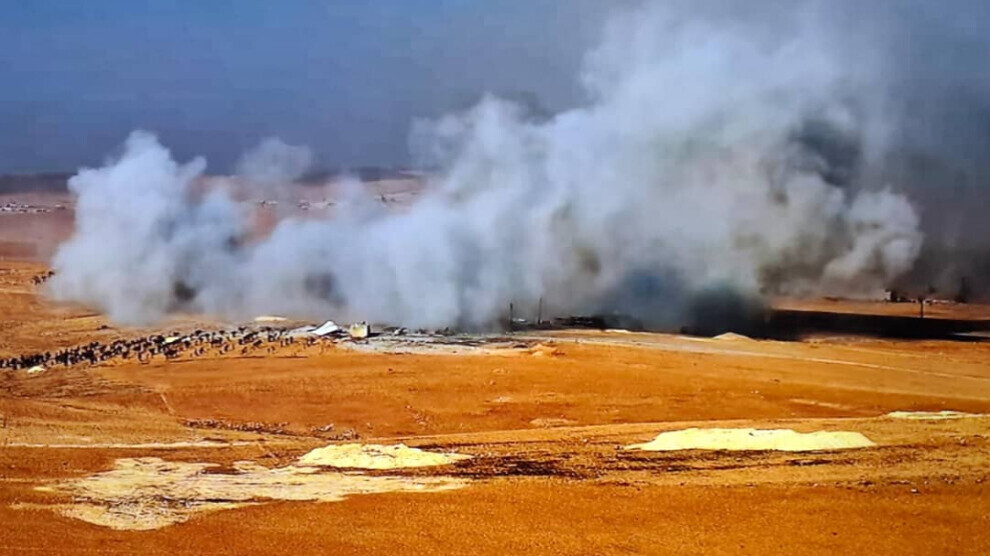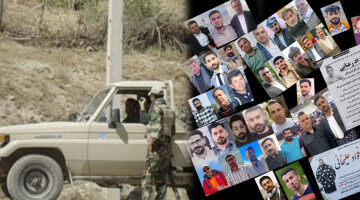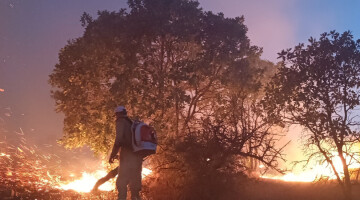The European Ecology Movement for Kurdistan (TEV-EKO) released a statement calling for an end to the Turkish bombardment on the Tishrin Dam in the Autonomous Administration of North and East Syria, warning against an imminent collapse of the dam.
The statement by TEV-EKO, which calls for urgent action to halt the ongoing attacks on Tishrin Dam and warns against irreversible destruction, includes the following:
“The Autonomous Administration of North and East Syria, that includes the Kurdish populated areas of Rojava, has stated that the Tishrin Dam at the Euphrates River is on the verge of collapse due to the intense attacks by Turkish military and affiliated jihadist-terrorist groups. The administration emphasized that the destruction of this massive water resource in its region, with a capacity of 1.9 billion cubic meters, threatens biological life in a long stretch of the Euphrates valley that is ecologically the most diverse landscape in that region. It has called on the international community to stand in solidarity before this major destruction takes place.”
For several years, the Turkish State and its affiliated jihadist groups have been destroying grain silos, electrical and water infrastructures, and civilian residential areas belonging to the Autonomous Administration of North and East Syria using war machinery. Attacks on food, water and electricity infrastructures create devastation that will impact future generations as well. While the Middle East is under the threat of severe drought, these attacks targeting water resources and infrastructure are not only targeting the people of the autonomous administration but all living beings in the region.
The purposeful destruction of ecological resources is a crime against humanity. These attacks constitute war crimes. By destroying resources, the right to existence of generations yet to come is being taken away. These attacks will force the region into a future extinction, leaving it dry, lifeless, and heavily polluted by the devastation of war for generations.
At this point, it is clear that the continuation of these attacks will result in irreversible destruction. Part of that would be the likely damage to the downstream Tabqa Dam, which is several times bigger in terms of height and water storage. It is even possible that the Tabqa dam could be destroyed and a resulting huge water wave would destroy human life, infrastructure as well as ecological life up to Deir ez-Zor and Iraq.
The 27 draft principles for “Protection of the Environment in Relation to Armed Conflicts” (PERAC), adopted by the UN General Assembly in December 2022, form the fundamental framework of international law on the “Prevention of the Exploitation of the Environment in Wars and Armed Conflicts.” Based on this, we call on the United Nations (UN) and all relevant international institutions to fulfill their responsibilities and take action.
We also appeal to the officials and governments in Europe; the destruction of the dam would affect a massive area and displace hundreds of thousands of people. In such a case, a new wave of migration and refugees, particularly to European countries, would be inevitable. If a new mass migration and refugee wave wants to be avoided, necessary steps must be taken immediately to stop these attacks.
In addition, there are camps and prisons in the region where thousands of ISIS terrorists and several ten thousand family members are being held under control by the autonomous administration. In the case of Tishrin dam’s destruction and resulting politically challenging conditions, control over these centers could be lost. We do not want to think of security risks that would arise in such a situation.
Given the recent developments in the Syrian civil war that led to regime changes, the Autonomous Administration of North and East Syria holds a key position for the establishment of a stable and democratic Syria. Therefore, the approach to the autonomous region is a fundamental measure for building a stable future in Syria.
We would also like to call for public sensitivity toward ecological issues and all appeal to democratic circles; we are once again facing attacks by Turkey and the affiliated jihadist groups, turning a water resource into a strategic weapon against society and living nature. The Autonomous Region of North and East Syria has developed over the last 13 years with a democratic, ecological, and women’s liberation perspective. Protecting this structure is our primary duty. In this sense, we call on everyone to raise their voices and show stronger reactions against the attacks.
We will continue to defend and strengthen our solidarity with the Autonomous Region of North and East Syria, where democratic and ecological consciousness is a fundamental principle.”














